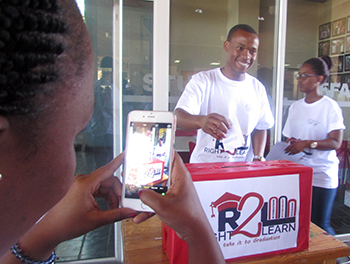Latest News Archive
Please select Category, Year, and then Month to display items
04 April 2024
|
Story Lunga Luthuli
|
Photo SUPPLIED
 Dr Juliet Kamwendo champions gender-inclusive climate action in Africa. Her expertise at the recently held AFR100 workshop highlighted vital steps towards sustainable and equitable development.
Dr Juliet Kamwendo champions gender-inclusive climate action in Africa. Her expertise at the recently held AFR100 workshop highlighted vital steps towards sustainable and equitable development.
Dr Juliet Kamwendo, Lecturer and Programme Director for Gender Studies in the Centre for Gender and Africa Studies at the University of the Free State, is spearheading efforts to integrate gender considerations into Africa's climate restoration agenda. Reflecting on her involvement, Dr Kamwendo stated, "This is particularly crucial, as women make up almost 50% of the population in Africa, and the depletion and degradation of land affect them disproportionately."
She recently served as a gender expert at the AUDA-NEPAD AFR100 workshop in Ouagadougou, Burkina Faso, from 25 to 29 March 2024. This initiative aims to restore forests and degraded land across Africa by 2030, with a focus on gender equality.
The workshop emphasised the integration of gender perspectives into the AFR100 project, acknowledging the disproportionate impact of land degradation on women. Dr Kamwendo's expertise highlighted the need to empower women in climate change interventions, addressing existing gender inequalities exacerbated by environmental degradation.
“Women – who are primarily responsible for household food security and water provision – bear the brunt of environmental degradation, leading to increased workloads, reduced income opportunities, and heightened vulnerability to climate-related disasters. Furthermore, the loss of forest cover and biodiversity further exacerbates the challenges faced by women, particularly in rural areas where they depend heavily on natural resources for their livelihoods,” added Dr Kamwendo.
Her participation highlights academia's crucial role in fostering inclusive and sustainable development, emphasising interdisciplinary collaboration to tackle complex environmental challenges. Through initiatives such as AFR100, stakeholders are working towards a more resilient and gender-responsive future for Africa.
Right to Learn campaign seeks to fund financially needy students
2015-11-11
 SRC President, Lindokuhle Ntuli, pledges financial support to the Right to Learn campaign.
Photo: Tango Twasa |
In response to the dire need for financial relief for academically deserving students from underprivileged backgrounds, the Student Representative Council (SRC) of the University of the Free State (UFS) launched the Right to Learn campaign on Friday 30 October 2015. The campaign, which aims to counter deregistration, was initiated following the national #FeesMustFall campaign, which gained momentum after students from the University of Witwatersrand first mobilised against the proposed fee increases for 2016.
The SRC’s Projects Committee realised that, although President Jacob Zuma had consented to a 0% increment, the lack of an increase would not eliminate the financial burden currently facing some students.
“The campaign was conceived at the SRC’s strategic planning meeting, and is now spearheaded by the SRCs Projects Committee,” said Letsika Leqoalane, SRC: Academic Affairs. “The campaign was founded on the university's value of ‘Superior Scholarship’ and the SRC’s value of reducing student financial exclusions,” he added.
Students in pursuit of continued access to education
The Right to Learn campaign was established as a supplementary initiative to the #FeesMustFall movement. “The Right to Learn campaign is an initiative to raise funds for students who are facing financial exclusion in the coming year,” said the SRC Academics Affairs officer.
All proceeds will be channeled towards reducing the number of students who will face de-registration in 2016, the SRC textbook bursary, and food bursaries. “This campaign stands on three pillars, namely: no to de-registration, no to student food insecurity, and yes to textbooks,” explained Leqoalane.
A call for support
According to SRC President, Lindokuhle Ntuli, “SRC members have made pledges of no less than R500 each from their own pockets.” The SRC is appealing to the UFS community to make donations into the campaign bank account, and thereafter to email the proof of payment to Ntuli at NtuliL@ufs.ac.za. The account details are:
Account number: 15-7085-0721 ABSA Bank Branch
Reference: SRC FUND
Branch Code: 632005 Cheque Account
Swift code: ABSAZAJJ